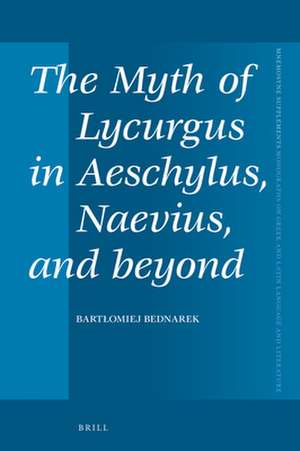The Myth of Lycurgus in Aeschylus, Naevius, and beyond: Mnemosyne, Supplements, cartea 441
Autor Bartłomiej Bednareken Limba Engleză Hardback – 11 mai 2021
Din seria Mnemosyne, Supplements
-
 Preț: 370.60 lei
Preț: 370.60 lei - 18%
 Preț: 1470.11 lei
Preț: 1470.11 lei - 18%
 Preț: 1598.51 lei
Preț: 1598.51 lei - 18%
 Preț: 735.03 lei
Preț: 735.03 lei - 18%
 Preț: 701.25 lei
Preț: 701.25 lei -
 Preț: 268.14 lei
Preț: 268.14 lei -
 Preț: 90.66 lei
Preț: 90.66 lei - 18%
 Preț: 584.02 lei
Preț: 584.02 lei -
 Preț: 169.79 lei
Preț: 169.79 lei -
 Preț: 216.33 lei
Preț: 216.33 lei - 18%
 Preț: 585.26 lei
Preț: 585.26 lei - 18%
 Preț: 581.91 lei
Preț: 581.91 lei - 18%
 Preț: 729.55 lei
Preț: 729.55 lei - 18%
 Preț: 657.49 lei
Preț: 657.49 lei - 15%
 Preț: 412.41 lei
Preț: 412.41 lei - 18%
 Preț: 708.10 lei
Preț: 708.10 lei - 18%
 Preț: 731.10 lei
Preț: 731.10 lei -
 Preț: 270.76 lei
Preț: 270.76 lei - 18%
 Preț: 730.73 lei
Preț: 730.73 lei - 18%
 Preț: 733.06 lei
Preț: 733.06 lei - 18%
 Preț: 586.34 lei
Preț: 586.34 lei - 18%
 Preț: 731.88 lei
Preț: 731.88 lei - 18%
 Preț: 586.18 lei
Preț: 586.18 lei - 18%
 Preț: 1544.99 lei
Preț: 1544.99 lei - 18%
 Preț: 731.65 lei
Preț: 731.65 lei - 18%
 Preț: 732.03 lei
Preț: 732.03 lei - 18%
 Preț: 972.54 lei
Preț: 972.54 lei - 18%
 Preț: 585.95 lei
Preț: 585.95 lei -
 Preț: 380.61 lei
Preț: 380.61 lei - 18%
 Preț: 718.31 lei
Preț: 718.31 lei - 18%
 Preț: 732.21 lei
Preț: 732.21 lei - 18%
 Preț: 586.26 lei
Preț: 586.26 lei - 18%
 Preț: 731.59 lei
Preț: 731.59 lei - 18%
 Preț: 1257.68 lei
Preț: 1257.68 lei - 18%
 Preț: 970.27 lei
Preț: 970.27 lei - 18%
 Preț: 557.30 lei
Preț: 557.30 lei - 18%
 Preț: 847.32 lei
Preț: 847.32 lei - 18%
 Preț: 732.44 lei
Preț: 732.44 lei - 18%
 Preț: 731.80 lei
Preț: 731.80 lei -
 Preț: 355.16 lei
Preț: 355.16 lei - 18%
 Preț: 588.14 lei
Preț: 588.14 lei - 18%
 Preț: 1211.56 lei
Preț: 1211.56 lei - 18%
 Preț: 586.11 lei
Preț: 586.11 lei - 18%
 Preț: 732.83 lei
Preț: 732.83 lei - 18%
 Preț: 732.35 lei
Preț: 732.35 lei - 18%
 Preț: 1484.13 lei
Preț: 1484.13 lei - 18%
 Preț: 731.59 lei
Preț: 731.59 lei - 18%
 Preț: 730.63 lei
Preț: 730.63 lei - 18%
 Preț: 732.03 lei
Preț: 732.03 lei - 18%
 Preț: 970.21 lei
Preț: 970.21 lei
Preț: 595.60 lei
Preț vechi: 726.34 lei
-18% Nou
Puncte Express: 893
Preț estimativ în valută:
113.97€ • 119.84$ • 94.17£
113.97€ • 119.84$ • 94.17£
Carte indisponibilă temporar
Doresc să fiu notificat când acest titlu va fi disponibil:
Se trimite...
Preluare comenzi: 021 569.72.76
Specificații
ISBN-13: 9789004463028
ISBN-10: 900446302X
Dimensiuni: 155 x 235 mm
Greutate: 0 kg
Editura: Brill
Colecția Brill
Seria Mnemosyne, Supplements
ISBN-10: 900446302X
Dimensiuni: 155 x 235 mm
Greutate: 0 kg
Editura: Brill
Colecția Brill
Seria Mnemosyne, Supplements
Notă biografică
Bartłomiej Bednarek, Ph.D. (2015), is a post-doc fellow at the University of Warsaw. He has published books and articles on religion and mythology, literature and theatre, gender and sexuality in ancient Greece and Rome.
Cuprins
Acknowledgments
List of Figures
Introduction
Shape of This Book
1 The Lycurgus Myth before Theatre
1.1Iliad 6.130–140: Who Are You, My Dear?
1.2Eumelus and the Early Dionysian Saga
1.3Presuppositions of the Homeric Passage: All that We Will Never Know about Life, Death, and Lycurgus
1.4Stesichorus’ fr. 276 (Finglass): The Gift of Dionysus
1.5Conclusions
2 Aeschylus’ Lycurgeia
2.1Introduction
2.2Tragic Trilogy
2.3The End of Lycurgus in Sophocles, Aeschylus, and Related Texts
2.4Orpheus in Fabula
2.5Reconstruction of the Lycurgeia
2.6Lycurgus satyricus
2.7Appendix I: Euripides’ Bacchae and Its Role in Dionysian Imagery
2.8Appendix II: Between Lycurgus’ and Pentheus’ Iconography
3 Naevius’ Lycurgus
3.1Fragments
3.2Beyond Fragments
3.3An Outline of the Plot
3.4The Readership of Naevius
4 Lost in Translation: Lycurgus between Aeschylus, Naevius, Poetry, and the Visual Arts
4.1From Aeschylus to Naevius
4.2Aeschylus’ Afterlife
4.3Plays with Lycurgus in the Title
4.4Iconography
4.5Instead of Conclusions
4.6Appendix: The Location of Lycurgus’ Kingdom and the Chronology of His Myth
5 Lycurgus monocrepis
5.1Introduction
5.2Lycurgus’ Self-Mutilation in Greek Texts
5.3Lycurgus’ Self-Mutilation in Latin Texts
5.4The Iconography of Lycurgus monocrepis
5.5The History of Research
5.6Conclusions
General Conclusions
Bibliography
Index
List of Figures
Introduction
Shape of This Book
1 The Lycurgus Myth before Theatre
1.1Iliad 6.130–140: Who Are You, My Dear?
1.2Eumelus and the Early Dionysian Saga
1.3Presuppositions of the Homeric Passage: All that We Will Never Know about Life, Death, and Lycurgus
1.4Stesichorus’ fr. 276 (Finglass): The Gift of Dionysus
1.5Conclusions
2 Aeschylus’ Lycurgeia
2.1Introduction
2.2Tragic Trilogy
2.3The End of Lycurgus in Sophocles, Aeschylus, and Related Texts
2.4Orpheus in Fabula
2.5Reconstruction of the Lycurgeia
2.6Lycurgus satyricus
2.7Appendix I: Euripides’ Bacchae and Its Role in Dionysian Imagery
2.8Appendix II: Between Lycurgus’ and Pentheus’ Iconography
3 Naevius’ Lycurgus
3.1Fragments
3.2Beyond Fragments
3.3An Outline of the Plot
3.4The Readership of Naevius
4 Lost in Translation: Lycurgus between Aeschylus, Naevius, Poetry, and the Visual Arts
4.1From Aeschylus to Naevius
4.2Aeschylus’ Afterlife
4.3Plays with Lycurgus in the Title
4.4Iconography
4.5Instead of Conclusions
4.6Appendix: The Location of Lycurgus’ Kingdom and the Chronology of His Myth
5 Lycurgus monocrepis
5.1Introduction
5.2Lycurgus’ Self-Mutilation in Greek Texts
5.3Lycurgus’ Self-Mutilation in Latin Texts
5.4The Iconography of Lycurgus monocrepis
5.5The History of Research
5.6Conclusions
General Conclusions
Bibliography
Index
